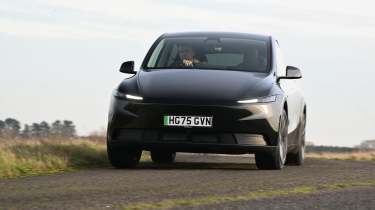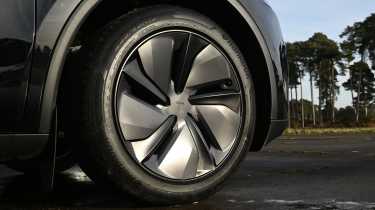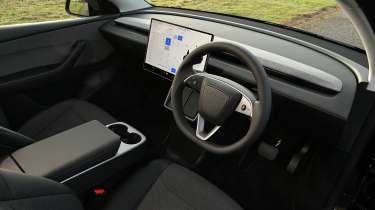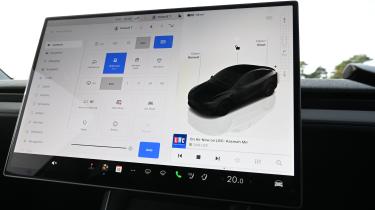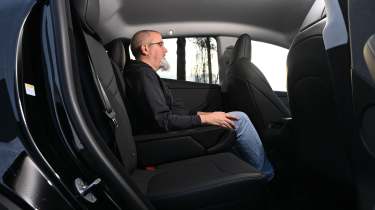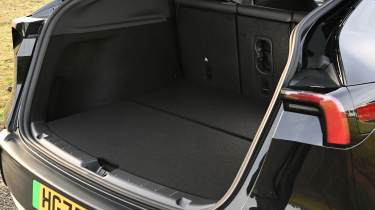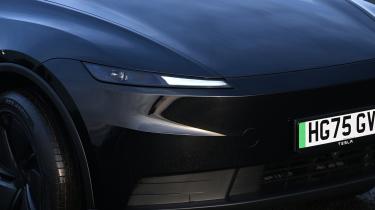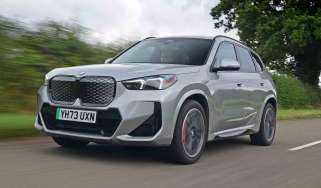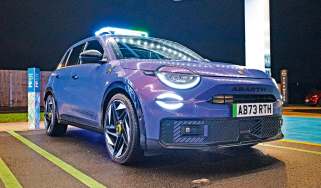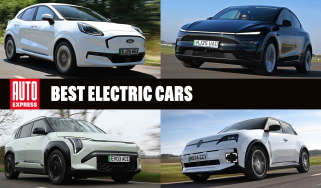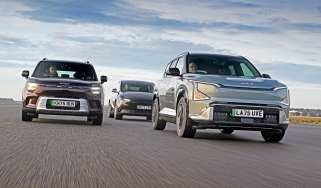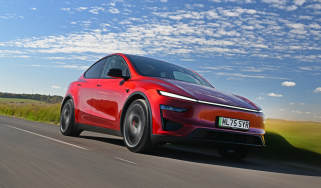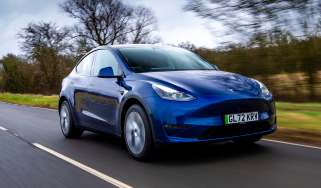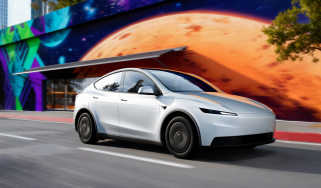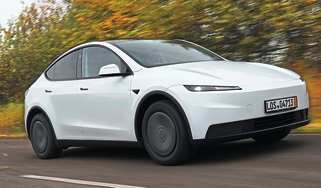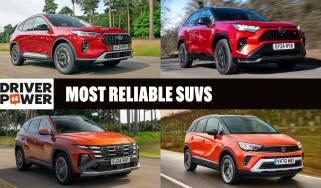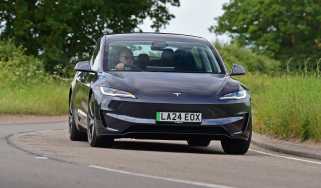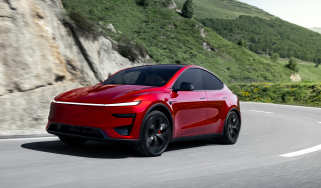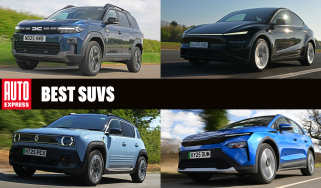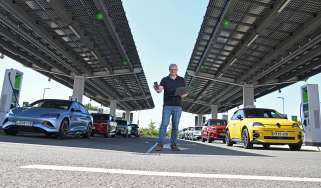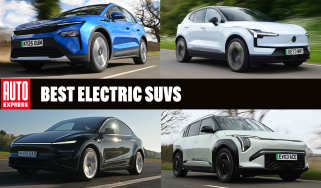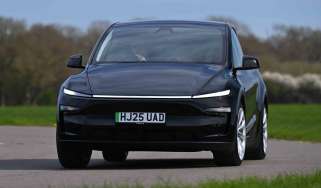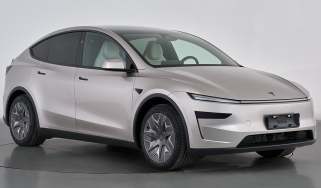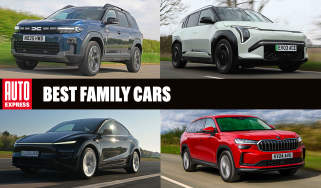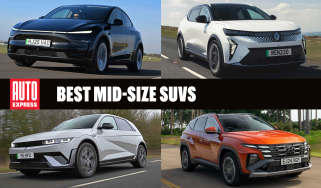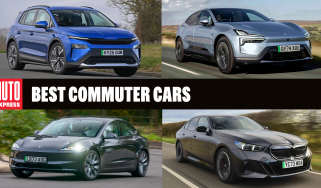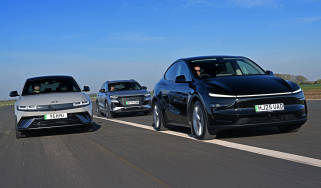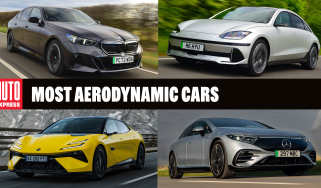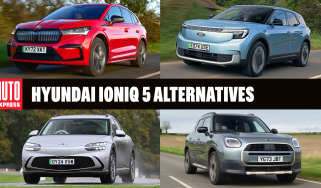Tesla Model Y review
The Tesla Model Y justifies its large sales numbers because it’s a front runner in the compact SUV class

Our opinion on the Tesla Model Y
There’s no getting away from the fact that the Tesla Model Y is still one of the best electric cars on sale in the UK today. Rivals are closer than ever, so it’s no longer the default choice for family SUV buyers, but there’s still a lot going for it that justifies its position as one of the most popular EVs that’s currently available to buy. Tesla’s engineers made a series of notable modifications to the car in 2025 to improve it even further, while the arrival of a new entry-level model brought the starting price down, too.
The latest update placed even more functions on the touchscreen and steering wheel, but we’d still like a few more physical buttons for features that are used in everyday driving. Beyond the cabin, both the ride and handling have been improved, while battery efficiency remains a big strong point. Combine this with Tesla’s market-leading Supercharger network, and the Model Y will continue to make a lot of sense for a lot of buyers. It’s simply one of the most rounded electric SUVs available today.
About the Tesla Model Y
When the Tesla Model Y first arrived, it was a car that was just right for so many UK buyers’ demands. As a result, it’s done big numbers in the UK sales charts, and in 2025 it repeated its 2024 success as the UK’s best-selling electric vehicle, beating the Tesla Model 3 saloon – now the only other car that the company sells in the UK – to the title.
Used - available now

2023 Tesla
Model Y
40,548 milesAutomaticElectric
Cash £27,000
2023 Tesla
Model Y
63,074 milesAutomaticElectric
Cash £20,900
2023 Tesla
Model Y
20,798 milesAutomaticElectric
Cash £26,800
2023 Tesla
Model Y
22,401 milesAutomaticElectric
Cash £25,089The Model Y is a mid-size SUV that’s based on the same running gear as the Model 3, but the extra height of its body offers more space for families, while the slippery shape means there isn’t much compromise in terms of efficiency when compared with the saloon.
Tesla makes constant revisions to the Model Y, and as of the start of 2026 it comes with two battery options called Standard and Long Range, with the latter available in Premium and Performance models. The base model can travel up to 313 miles on a full charge, while the rear-wheel drive Long Range model can cover 387 miles. Intriguingly, adding a second motor for four-wheel drive doesn’t impact range, with a quoted figure of 391 miles for that version. The Model Y Performance returned to the line-up late in 2025 with a 460bhp power output and an official range of 360 miles.
Tesla Model Y prices and latest deals
You can lease a Tesla Model Y from £558 per month or buy a used model at prices starting from £45,999.
Check out our latest leasing deals and used car deals for the top offers available now on Auto Express. And don't forget we can help you sell your car, too.
The most recent revisions to the Model Y mean that the Standard car starts from £42,000, a reduction of £3,000 from before. The Premium Long Range is around £49,000, while adding All-Wheel Drive takes the price to £52,000. At the top of the range, the Performance version is £62,000.
There are leasing options on all Tesla Model Y variants available on the Auto Express Buy A Car service. If you want to save some cash there are also loads of older used Tesla Model Ys starting from around £20,000.
Performance & driving experience
Pros |
|
Cons |
|
Tesla has delivered strong powertrains ever since the Model S came to market a decade ago, but only now is its chassis tech close to matching it. While the Model Y was disappointingly firm when first launched, the current car is far more refined.
| Model | Power | 0-62mph | Top speed |
| Model Y Standard | 292bhp | 6.9 seconds | 110mph |
| Model Y Premium AWD | 370bhp | 4.6 seconds | 125mph |
| Model Y Performance | 453bhp | 3.3 seconds | 155mph |
Electric motors, 0-60mph acceleration and top speed
There are no two ways about it, the Tesla Model Y is quick. Even the Standard Range model has plenty of acceleration, while the heavier but more powerful Long Range car is even faster. Adding AWD boosts traction, not that the standard rear-wheel drive layout lacks grip off the line.
Equipped with Tesla’s ‘4DU’ powertrain, the Model Y Performance’s twin-motor set-up pumps out a healthy 453bhp, but while Tesla doesn’t quote an official torque figure, there’s certainly plenty on offer, and it’s available from the moment the driver squeezes the right pedal. The 0-62mph dash of 3.3 seconds is right up with the quickest of high-power SUVs.
From our experience, the Standard Range car’s straight-line punch will be more than enough for most drivers. Power is delivered smoothly from the get-go, and while the acceleration times vary, the experience of flooring the accelerator in a Tesla doesn’t drastically change until you get to the crazy Performance version.
One of the few physical changes that came with the Tesla Model Y’s update in 2025 was the removal of the gearshift stalk. The main drive mode selector is now located on the screen and only shows up when you’re stationary with your foot on the brake. It seems an odd arrangement at first, but it’s easy to get used to. In another unusual touch, there’s also a secondary bank of drive mode selector controls on the ceiling that only illuminate and function when the car is stationary.
Town driving, visibility and parking
A low bonnet and relatively high driving position makes placing the Model Y a breeze on narrower roads. However, while the view out the front is excellent, a comically small rear window makes it hard to see out of the back. This situation isn’t helped by the lack of a rear windscreen wiper. Tesla forces you to rely on a range of cameras that make driving in tight spots fairly stress-free once you get used to it. Updates have added an extra camera in the front bumper to help with parking, and the resolution on the feeds from all exterior cameras is extremely good.
Unlike the Model 3 and its button-operated indicators, the facelifted Model Y still has a stalk. It’s not entirely successful because It feels cheap and is a faff to use because it doesn’t click into place – making cancelling a signal needlessly difficult. It’s almost as if Tesla is persuading owners of the merits of touchscreens by deliberately making its physical controls less than ideal.
At low speeds, the Model Y’s biggest flaw is its fairly poor turning circle, because in every other respect it’s quiet, refined and is able to smooth out rougher roads easily. The Performance drives much like any other model in the range. Ride comfort is a touch firmer on 21-inch wheels, but not unpleasantly so.
Country road driving and handling
Tesla has gradually enhanced the comfort of the Model Y as the years have passed. It has a firmer edge at higher speeds (making it a more unsettled choice in the class), but there’s greater sophistication than before, with improved body control over all but the most severe potholes and undulations.
Body roll is pretty well contained in corners, and grip is relatively strong through a balanced chassis that edges towards understeer when pushed. It’s easy to reach that limit, because the hyper-sensitive steering makes it easy to turn the front axle faster than the chassis can handle. Given that the steering has a gloopy weight and precious little feedback, driving the Model Y with enthusiasm is not very enjoyable.
The Model Y Performance is capable of covering ground at stunning speed. Fast and competent as it is, though, keen drivers will be left feeling largely detached from the action.
It’s been lavished with a series of upgrades, the most obvious being a staggered set of 21-inch alloy wheels, but behind them sit new springs, adaptive dampers, steering knuckles, plus a stabiliser bar and bushings, all tied together with unique geometry to make it handle more sharply with minimal compromise on comfort.
Viewed by those metrics, the Performance model is a success. For its size and weight (at roughly two tonnes, it’s a little less portly than some other fast electric SUVs) it controls its body very well over even challenging roads, yet does so without delivering an unduly stiff ride. The adaptive dampers clearly play a part here, yet we struggled to find much – if any – difference between the two damper settings.
Grip is pretty resolute in the dry, and with most of the vehicle’s mass located low and centrally, it’s superbly balanced in corners. A “Reduced” setting for the stability control lets the driver explore this balance further, but in the dry it would take a very committed (or clumsy) motorist to exceed its limits.
We’ve often criticised the odd feel and shortage of feedback of Tesla’s steering systems. But even though the bar has been set pretty low, the Model Y Performance has the best response through the wheel of any Tesla yet. We liked it best in its Standard weight, where it feels most natural, allowing the driver to enjoy the ultra-responsive rack to exploit the huge grip levels. However, that isn’t to say that we never completely trusted it; feel and feedback are very important qualities in a car this quick, and the Performance hasn’t added either.
Motorway driving and long-distance comfort
Double-glazed windows and additional soundproofing were added during the most recent facelift, and that becomes really noticeable at the national limit. Here the Model Y is far more refined, with less road noise than in the original car. The Performance’s ride doesn’t fidget as much as lesser models, although there’s still just an underlying hint of firmness, even at speed.
Tyre roar was once a significant issue in the Model Y, and while it remains present in the cabin, it’s more muted. Once again, the steering takes getting used to, because it’s so sensitive that you need only the tiniest of corrections to keep on course, although in reality Tesla expects you to take advantage of its Autopilot advanced cruise control tech rather than driving manually.
"Tesla has always produced fast EVs, but the reality is that even the Model Y Standard has more than enough performance for most needs. It offers instant responses, while the rear-wheel drive configuration offers good traction where front-wheel drive rivals struggle to get the power to the road."- Dean Gibson, Senior test editor.
Range, charging & running costs
Pros |
|
Cons |
|
One area where Tesla steals a march over rivals is its advanced battery technology. Standard models feature a lithium iron phosphate pack, while Long Range cars come with a more advanced lithium nickel manganese cobalt oxide unit for greater energy density.
Electric range, battery life and charge time
Official battery sizes aren’t quoted on Tesla’s website, but range figures place the Model Y in the leading pack of electric compact SUVs. The best performer is the Premium AWD with a WLTP tested maximum of 390 miles. That’s more than the rear-wheel drive version with the same battery, but not by much, at 387 miles. The smaller battery in the Standard car is good for 313 miles of range, which is still better than a lot of rivals.
Our first time behind the wheel of the updated car was of the Long Range All Wheel Drive Launch Edition in temperatures in the high teens and included plenty of motorway miles. It resulted in a figure of 3.9 miles/kWh, which was enough for a range of 293 miles.
On a more relaxed, shorter trip with no motorway driving, the Model Y Long Range All Wheel Drive returned a superb 5.6mi/kWh, which would’ve resulted in the Tesla covering 420 miles between charges. That figure is for a model equipped with the optional 20-inch wheels, which has a slightly shorter official range than versions with 19-inch wheels.
A heat pump features on all versions of the Model Y, so when we tested the Standard car in cold wintry conditions, it still proved more efficient than the Kia EV5 and Smart #5 in the same weather. We managed a return of 3.6mi/kWh, which offered a range of 227 miles – the Kia managed 3.1mi/kWh but can go further courtesy of its larger battery.
At the other end of the spectrum, the Model Y Performance delivered a range of 301 miles in chilly conditions, although this is some way short of its official 360-mile figure.
When it comes to charging, few manufacturers can touch the convenience of Tesla’s Supercharger network. Simply drive to a location, park up and plug in. Once you have enough charge, you can leave, and your usage is charged by direct debit each month. We really wish all charging networks were this easy to use. Just don’t forget that EVs from other brands can now use the Tesla Supercharging network, so you may see non-Teslas in ‘your’ charging bay.
Thanks to its 250kW charging capability, the Model Y is among the fastest-charging cars in its class, although the Standard model has to make do with a maximum rate of 175kW. One helpful feature is the Model Y’s ‘pre-charging’, which sets the optimum temperature for the battery ahead of a planned charging stop to ensure the quickest top-up speed is achieved. We found that this worked pretty seamlessly, like the Tesla charging experience as a whole, although if you’re travelling to more remote parts of the UK you might have to rely on public networks because Superchargers only tend to feature at dealerships or other high-traffic areas, such as motorway services.
| Model | Battery size | Range | Insurance group |
| Model Y Standard | 63kWh (est) | 313 miles | 34 |
| Model Y Premium AWD | 85kWh (est) | 390 miles | 43 |
| Model Y Performance | 83kWh (est) | 360 miles | 47 |
Insurance groups
With fewer frills than the rest of the range, the revised base Model Y starts off in group 34 (out of 50), that’s down from group 37, while the Long Range car is in group 39, down from group 45 before the facelift. The dual-motor Long Range went from 48 to 42, while the Performance is in group 47. However, despite these revisions, when we sourced insurance quotes for the base Model Y and the top-spec Kia EV5 (group 42), the Kia’s quote was around half that of the Tesla’s, £750 to the Model Y’s £1,457 quote.
Tax
Standard and Premium versions of the Model Y fall below the £50,000 luxury car tax supplement for road tax, so that might be worth considering if you’re choosing between rear-wheel drive or AWD for the Premium variant.
Company car users benefit from the lowest Benefit-in-Kind (BiK) tax bandings offered to EVs, and the whole Model Y range is in the three per cent bracket, just like every other electric car on the market. That means there’s more to pay than in the past, but still considerably less than they are for hybrids and PHEVs.
Depreciation
Industry expert CDL estimates that the majority of the Model Y range will hold on to roughly half of its original value after three years or 36,000 miles, which is competitive for the family EV sector. The outlier is the Performance model; it’s the most pricey to buy, and as such, it’s expected to lose a little more of its value; expect to get back roughly 46 per cent of that £62,000 purchase price after three years.
Interior, design & technology
Pros |
|
Cons |
|
On the outside, the updated Model Y benefitted from a Cybertruck-style light bar across the nose, while at the rear the full-width light is set into the tailgate and reflects in the bodywork. However, the Standard model doesn’t get either of these features for an even more simplified look, which makes the Model Y just look like a homogenised blob of an electric SUV.
Interior and dashboard design
If understatement is your thing, then the Model Y is the car for you. Aside from the huge touchscreen, the dashboard is bare, but its simple design does contain some neat details; air from the climate control system flows through a slim slot that runs the full width of the dash, for example. Some of our road testers love the understated look, but others find it so bare that the design seems almost unfinished, especially in Standard guise, where the cabin ambience feels better suited to an Uber than family transport.
One of the few actual buttons is for the hazard warning switch, which is set into the headlining, but there are extra controls on the steering wheel, including the windscreen wiper washers and the headlight flasher. The latter works OK in practice, but we still think it’s a poor decision to remove a physical control for the headlights. While automatic lights make this less necessary than before, they’re not perfect; we’d much rather be able to take control manually if we need to. Turning the lights on required a longer press of the button, which can be quite annoying.
Materials and build quality
Fit and finish were certainly a weakness of earlier Teslas, but things have improved dramatically. We’d say it’s still not perfect; when we’ve tested Model Ys, we’ve seen trim panels between the doors and dash that don’t quite align perfectly, had creaks from footrests and loose threads on the steering wheel.
The Standard model looks as if it’s been built down to a price with its grey fabric seats, but the upholstery actually feels good and offers decent comfort. Elsewhere there are swathes of plastic, while higher-spec cars add faux leather and extra fabric around the interior. Don’t be scared of getting the black and white interior option rather than the purely black trim, either – the bright white seat coverings felt durable to us and were easy to clean.
Infotainment, sat-nav and stereo
Buyers coming from many other car brands might find the Model Y something of a culture shock at first, because that minimalist cabin is almost completely free of physical controls. When everything is controlled through that big touchscreen, it needs to be very well designed – and, to Tesla’s credit, it is.
While it’s logically thought out, there are still many features which would be easier to use if they weren’t on a touchscreen; chief among these are the lights, which default to automatic, but we’d much prefer to have manual control of them without having to dip into the display menus.
We like the Tesla’s sat-nav configuration, which, in its satellite imagery mode, gives you a perfectly clear and concise view. Along with the great mapping, the navigation for Tesla’s Supercharger network is easy to programme on the move, and it even alerted us when pre-conditioning for the battery began before we arrived at the charging station. Dive into the driving data sections, and it will show some neat graphs, allowing the most nerdy of us to analyse how the car’s energy was used over previous journeys.
Not only is Tesla’s charging network brilliant, but the car helps out there, too. By plotting a route in the navigation, the Model Y will calculate where to stop and how much charge is needed to reach your destination. It will also optimise its battery temperature on the way to a charger, so that charging speeds are as quick as possible upon arrival.
In the back, the facelifted Model Y Long Range introduced an eight-inch touchscreen sitting in the middle for climate controls, audio, games and even media applications such as Netflix and YouTube. It’s a nice touch that passengers will appreciate.
If you only ever encounter the entry-level Model Y, then you’ll probably be happy with it, but compared with the rest of the range there are some very obvious compromises that have been made to keep costs down. The cabin is remarkably austere, almost taxi-like in its specification with no frills, grey cloth upholstery and acres of black plastic. - Dean Gibson, Senior test editor.
Boot space & practicality
Pros |
|
Cons |
|
The Model Y only comes as a five-door SUV, but its shape means it blurs the lines between regular models and coupé-style variants such as the Volkswagen ID.5 and Skoda Enyaq Coupe. The Tesla’s body is tall, though, so interior space is excellent. The boot is also massive thanks to a low floor – although all of this means the Model Y is more akin to an MPV than an SUV. There’s not a lot of ground clearance, though, so don’t expect to take AWD models off road.
Dimensions and size
The Tesla Model Y is one of the larger cars in the compact electric SUV sector. It’s long and wide, but isn’t as tall as a Smart #5 and has a marginally shorter wheelbase, too. This doesn’t have a negative impact on cabin space, however.
| Dimensions comparison | |||
| Model | Tesla Model Y | Kia EV5 | Smart #5 |
| Length | 4,797mm | 4,610mm | 4,695mm |
| Width | 1,982mm | 1,875mm | 1,920mm |
| Height | 1,624mm | 1,680mm | 1,705mm |
| Wheelbase | 2,890mm | 2,750mm | 2,900mm |
| Boot space | 845 (to roof)-2,118 litres | 566-1,650 litres | 630-1,530 litres |
| Bonnet space | 88 litres | 44 litres | 72 litres |
Seats & passenger space
One benefit of the Model Y’s minimalist cabin design is that the base of the windscreen is set low relative to the seats. As a result, the view out to the front is much clearer than in pretty much any other alternative SUV. Unfortunately, the back window spoils the impressive view, because its shallow angle means it appears absolutely tiny in the rear-view mirror.
The Model Y Performance gets a more supportive set of seats than the less sporty versions, and they have an adjustable thigh bolster to further boost comfort. There’s a decent range of adjustment in the steering wheel, although some testers would like the wheel, which is slightly smaller than in many rivals, to adjust a little lower.
Two huge storage bins between the front seats are split by a pair of cup-holders. Along with the roomy door pockets, interior cubby spaces are in plentiful supply. There is a glovebox, too, which is opened via a button on the touchscreen.
The key difference between the Model Y and the smaller Model 3 saloon is in the back, where the former offers much more space for passengers. The floor is flat, and the seats are comfortable and well positioned, giving lots of under-thigh support, and generous foot space beneath the front seats. Despite the sloping roof angle, there’s more than enough headroom for even tall passengers, while a fold-down armrest houses two cup-holders.
Boot space
At 854 litres, the Model Y’s boot looks suspiciously large on paper, and it is. Unlike other car makers, Tesla measures a volume to the roof, rather than the window line. We can ignore that, though, because what really matters is the actual space on offer, and it’s huge.
The boot volume itself is very generous, and that’s before you factor in the huge under-floor area. There’s a front boot too (improved in 2025 with a drain plug for hosing it out after carrying dirty items), which is a little smaller in the dual-motor models than rear-wheel-drive cars, but still spacious when compared with most rivals. Here there is more obvious cost cutting on the Model Y Standard, with no plastic trim covering the ancillaries such as the washer reservoir and other electrical items. The bonnet itself is made from a very flimsy piece of sheet metal, too, and closes with a clang when shut.
Towing
A tow hitch is a £1,350 option on every Model Y, and all models are able to haul up to 1,600kg. This is much more than the Renault Scenic’s 1,100kg limit, but the Kia EV6 leads the way at up to 1,800kg.
Reliability & safety
Pros |
|
Cons |
|
The latest Driver Power survey for the best cars to own saw the Model Y come an excellent 15th, with owners praising software updates, powertrains and running costs. Tesla itself achieved an impressive second place overall in the 2024 Driver Power customer satisfaction survey of best car manufacturers, before dropping to 11th in 2025.
The Model Y scored a maximum five stars out of five in the Euro NCAP crash test in 2022. It has since been rested again in 2025, and the good news is that it maintained the five-star rating. However, the Tesla’s adult occupant protection and safety assist scores did decline slightly. On the plus side, its child occupant and vulnerable road user protection scores increased.
| Euro NCAP safety ratings | |
| Euro NCAP safety rating | Five stars (2025) |
| Adult occupant protection | 91% |
| Child occupant protection | 93% |
| Vulnerable road user protection | 86% |
| Safety assist | 92% |
Tesla offers buyers a four-year warranty with four years of breakdown cover. The latter is a very generous package, while the former ranks Tesla ahead of the premium German brands, if not the likes of Hyundai, Kia and MG, which provide either five or seven years of manufacturer cover.
The minimal running costs served up elsewhere by the Model Y also apply to servicing. Recommended maintenance consists of a biennial cabin filter change and brake fluid check, plus a suggested tyre rotation every 6,250 miles. Otherwise, there are zero service costs.
Buying and owning
- Best buy: Tesla Model Y Premium Long Range
The Long Range rear-wheel drive model offers a more upmarket experience than the standard car, and it can travel further on a charge. A sub-£50,000 list price means it’s cheaper for road tax than the AWD version, too.
Tesla Model Y alternatives
On merit, the Tesla Model Y is one of the best electric SUVs on the market, but there are a few options that come close to matching the Model Y. The updated Hyundai Ioniq 5 is a top pick as an alternative. It has the looks of a hatchback, but is as big as the Model Y, and offers a long range and lots of room. The Genesis GV60 and Kia EV6 use the same EV technology as the Hyundai, just in packages that look a little different.
The Model Y Standard reduces prices to put the car on par with newer arrivals such as the Kia EV5 and Smart #5, both of which kept the Model Y honest on test, although the Model Y’s greater efficiency still puts it ahead of both.
Other options include the Audi Q4 e-tron and Cupra Tavascan, which share the same platform, or the Volkswagen ID.4 and Volkswagen ID.5 duo, again, based on the same running gear as the Audi and Cupra. BYD is a major threat, and its BYD Sealion 7 offers good value and plenty of tech. Other options come from BMW in the shape of the BMW iX1 and the coupe-SUV BMW iX2, or the Mercedes EQA and the more practical Mercedes EQB.
Frequently Asked Questions
The Model 3 is slightly faster than the Model Y because, while they share the same electric motors, the Model Y is a little heavier.
Deals on the Model Y and alternatives

